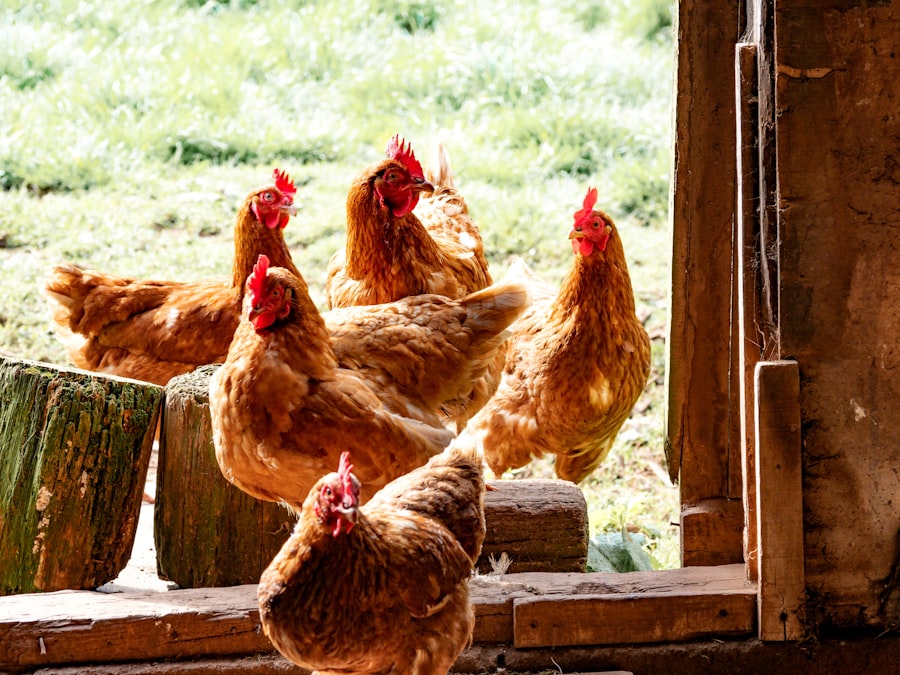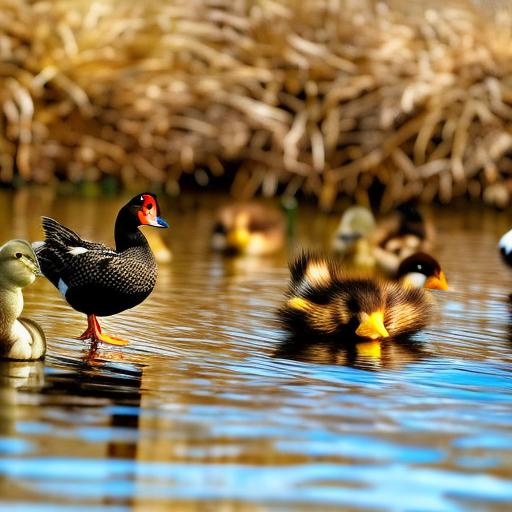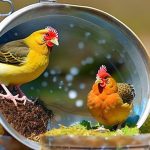Keeping ducks and chickens together in the same coop is a topic that many poultry enthusiasts are interested in. While there are benefits to cohabitating these two species, there are also challenges that need to be considered. In this article, we will explore the differences between ducks and chickens, the advantages of keeping them together, factors to consider before doing so, the importance of a proper chicken coop, design considerations for a coop that houses both species, the appropriate size of the coop, feeding requirements, and health concerns. By the end of this article, you will have a better understanding of whether it is possible to keep ducks with chickens and under what conditions.
Key Takeaways
- Ducks and chickens have different needs and behaviors, but can be kept together with proper planning.
- Keeping ducks and chickens together can provide benefits such as pest control and increased egg production.
- Factors to consider before keeping ducks with chickens include space, water access, and potential for disease transmission.
- A proper chicken coop is essential for the health and safety of both ducks and chickens.
- Chicken coop design for ducks and chickens should include separate areas for nesting and roosting, as well as access to water for ducks.
Differences between ducks and chickens
Ducks and chickens have distinct physical and behavioral differences that can affect their cohabitation. Physically, ducks have webbed feet and a waterproof layer of feathers, while chickens have scaly feet and feathers that are not as water-resistant. This means that ducks are more suited for water-based activities, such as swimming and foraging in wet areas, while chickens prefer to stay on dry land.
In terms of behavior, ducks are generally more active and curious than chickens. They enjoy exploring their surroundings and can be quite noisy. Chickens, on the other hand, tend to be more docile and prefer to stay close to their coop. These behavioral differences can sometimes lead to conflicts between the two species if they are not properly managed.
Advantages of keeping ducks and chickens together
Despite their differences, there are several advantages to keeping ducks and chickens together in the same coop. One benefit is pest control. Ducks are natural foragers and enjoy eating insects, slugs, and snails. By allowing them to roam freely with chickens, they can help control pests in the area.
Another advantage is companionship. Ducks and chickens can form bonds with each other and provide social interaction. This can be especially beneficial for ducks, as they are highly social animals and can become lonely if kept alone.
Additionally, ducks and chickens can complement each other in terms of foraging and egg production. Ducks are excellent foragers and can help find food sources that chickens may have missed. They also have a higher egg production rate than chickens, so having ducks in the coop can increase the overall egg yield.
Factors to consider before keeping ducks with chickens
Before deciding to keep ducks with chickens, there are several important factors to consider. One factor is space. Ducks require more space than chickens, both in the coop and in the outdoor area. They need access to water for swimming and foraging, so a pond or shallow pool should be provided. Additionally, ducks are more active than chickens and need room to roam.
Temperament is another factor to consider. Ducks can be more assertive and dominant than chickens, especially when it comes to food and water. This can lead to conflicts if not properly managed. It is important to observe the behavior of both species before introducing them to ensure compatibility.
Diet is also an important consideration. Ducks have different dietary needs than chickens and require a higher protein content in their diet. It is important to provide a balanced diet that meets the nutritional needs of both species.
Proper planning and preparation are crucial before keeping ducks with chickens. It is recommended to have separate areas within the coop for each species, as well as separate feeding and watering stations. This will help prevent conflicts and ensure that each species has access to their specific needs.
Importance of a proper chicken coop
A proper chicken coop is crucial for the health and safety of both ducks and chickens. It provides shelter from predators, protection from the elements, and a comfortable living space. A well-designed coop also helps prevent the spread of diseases and parasites.
Ventilation is an important aspect of a chicken coop. Good airflow helps regulate temperature and prevents the buildup of moisture, which can lead to respiratory issues. Windows or vents should be installed to allow fresh air to circulate.
Nesting boxes are essential for both ducks and chickens. They provide a safe and comfortable space for laying eggs. The number of nesting boxes should be sufficient for the number of birds in the coop, with at least one box per four to five hens.
Roosting bars are also important for chickens. They provide a place for chickens to perch and sleep at night. The bars should be wide enough for the chickens to comfortably grip and spaced far enough apart to prevent overcrowding.
Chicken coop design for ducks and chickens

When designing a chicken coop that will house both ducks and chickens, there are specific considerations to keep in mind. One important aspect is the flooring. Ducks require a solid floor, such as concrete or wood, to prevent their feet from getting wet and muddy. Chickens, on the other hand, prefer a dirt or straw floor for scratching and dust bathing. Providing separate areas with different flooring options can accommodate the needs of both species.
Water access is another important consideration. Ducks need access to water for swimming and cleaning their feathers. A shallow pool or pond should be provided within the coop or in the outdoor area. It is important to ensure that the water is clean and changed regularly to prevent the spread of diseases.
Size of the chicken coop for ducks and chickens
The size of the chicken coop is an important factor that can affect the well-being of ducks and chickens. Both species require adequate space to move around comfortably and engage in their natural behaviors.
A general guideline for determining the appropriate size of the coop is to allow at least 4 square feet per chicken and 10 square feet per duck. This includes both indoor and outdoor space. It is important to consider not only the number of birds but also their size, as larger breeds may require more space.
In addition to the overall size of the coop, it is important to provide enough perches, nesting boxes, and feeding and watering stations for all the birds. Overcrowding can lead to stress, aggression, and the spread of diseases.
Feeding requirements for ducks and chickens in the same coop
Ducks and chickens have different dietary needs, but it is possible to feed them together in the same coop with proper planning. Ducks require a higher protein content in their diet, so it is important to provide them with a balanced feed that meets their nutritional needs. This can be achieved by offering a poultry feed that is specifically formulated for ducks or by supplementing their diet with additional protein sources, such as mealworms or fish.
Chickens can eat the same feed as ducks, but they may not require as high of a protein content. It is important to monitor their body condition and adjust their feed accordingly. Providing separate feeding stations for each species can help prevent conflicts and ensure that each bird gets the appropriate amount of food.
It is also important to provide fresh water for both ducks and chickens. Ducks require access to water for swimming and cleaning their feathers, while chickens need water for drinking. Separate water stations should be provided to prevent contamination and ensure that each species has access to clean water.
Health concerns for ducks and chickens in the same coop
Keeping ducks and chickens together in the same coop can pose some health concerns that need to be addressed. One concern is disease transmission. Ducks and chickens can carry different diseases, some of which can be transmitted between species. It is important to practice good biosecurity measures, such as regular cleaning and disinfection of the coop, to prevent the spread of diseases.
Parasites are another health concern. Ducks and chickens can be affected by different parasites, such as mites and lice. Regular monitoring and treatment for parasites are important to ensure the health and well-being of both species.
It is also important to provide proper nutrition and a clean environment to prevent health issues. Ducks and chickens that are not provided with a balanced diet or are exposed to unsanitary conditions are more susceptible to diseases and other health problems.
Can you keep ducks with chickens?
In conclusion, it is possible to keep ducks with chickens in the same coop, but it requires careful planning and consideration of their specific needs. Ducks and chickens have different physical and behavioral characteristics that need to be taken into account. Providing a proper chicken coop that meets the needs of both species is crucial for their health and well-being.
By considering factors such as space, temperament, diet, and health concerns, you can create a harmonious living environment for ducks and chickens. With proper planning and preparation, keeping ducks with chickens can be a rewarding experience that provides benefits such as pest control, companionship, and increased egg production.
If you have experience keeping ducks with chickens, we encourage you to share your tips and insights in the comments below. Together, we can learn from each other and create a community of poultry enthusiasts who are passionate about raising ducks and chickens in harmony.
If you’re wondering whether you can keep ducks with chickens, you might also be interested in learning about the compatibility of guinea fowl and chickens. Poultry Wizard has an informative article on this topic, which explores whether guinea fowl can live harmoniously with chickens. To find out more about this fascinating combination, check out their article here. Additionally, if you’re interested in breeding chickens and want to know how long it takes for chicken eggs to hatch naturally, Poultry Wizard has another helpful article that provides insights into this process. You can read it here. Lastly, if you’re considering setting up a garden chicken coop, Poultry Wizard offers valuable tips and advice in their article on creating a functional and beautiful coop for your feathered friends. Discover more about it here.
FAQs
Can I keep ducks with chickens?
Yes, it is possible to keep ducks with chickens.
Do ducks and chickens get along?
Yes, ducks and chickens can get along well if they are introduced properly and have enough space.
What are the benefits of keeping ducks and chickens together?
Keeping ducks and chickens together can provide a variety of benefits, including pest control, increased egg production, and entertainment.
What are the challenges of keeping ducks and chickens together?
One of the main challenges of keeping ducks and chickens together is that ducks require more water than chickens, which can make the coop and surrounding area wet and muddy.
What should I consider before keeping ducks and chickens together?
Before keeping ducks and chickens together, you should consider the space requirements, feeding needs, and potential health risks. It is also important to ensure that the coop and surrounding area are suitable for both species.
What should I feed my ducks and chickens?
Ducks and chickens have different dietary needs, so it is important to provide them with separate feeders and appropriate feed. Ducks require more protein and niacin than chickens, and also need access to water for swimming and drinking.
How can I introduce ducks to my existing flock of chickens?
To introduce ducks to an existing flock of chickens, it is best to do so gradually and under close supervision. It is also important to provide enough space and resources for both species to avoid competition and aggression.
Meet Walter, the feathered-friend fanatic of Florida! Nestled in the sunshine state, Walter struts through life with his feathered companions, clucking his way to happiness. With a coop that’s fancier than a five-star hotel, he’s the Don Juan of the chicken world. When he’s not teaching his hens to do the cha-cha, you’ll find him in a heated debate with his prized rooster, Sir Clucks-a-Lot. Walter’s poultry passion is no yolk; he’s the sunny-side-up guy you never knew you needed in your flock of friends!







